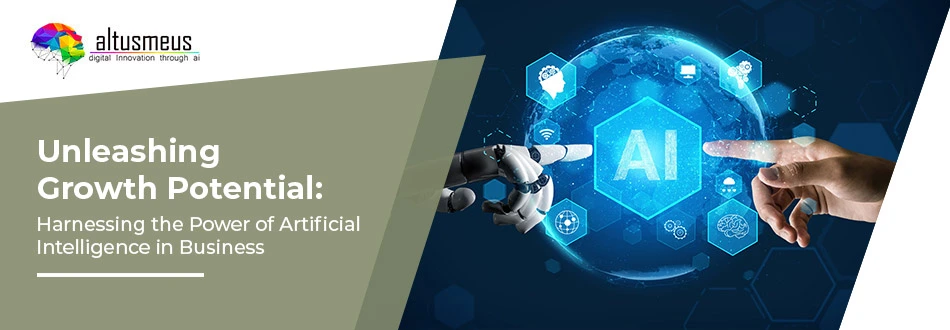These days, the business environment is changing at a rapid pace due to the constantly evolving technological landscape. As a result, businesses are actively seeking innovative methods to outperform their competition, drive growth, increase profits, and enhance customer satisfaction. One of the most effective approaches for businesses to achieve these goals is by leveraging the power of Artificial Intelligence (AI).
AI has the capability to help companies comprehend vast amounts of data, extract valuable insights, make accurate predictions, automate daily processes, assist in developing marketing strategies, and serve as the most intelligent member of the organization. In essence, AI has the potential to revolutionize business operations and drive growth strategies. In this blog, we will delve into the various ways in which AI can transform business growth strategies and empower organizations to thrive in the digital age.
Here are a Few Ways in Which AI Can Help Businesses Transform Their Growth Strategies:
1. Data-Driven Decision-Making: With the help of AI tools, businesses can analyze vast amounts of data quickly and accurately, helping them identify various important datasets, patterns, and valuable insights. This, in turn, enables them to make informed business decisions based on data, which certainly contributes to their business growth.
2. Personalized Customer Experiences: With AI algorithms and tools, businesses can uncover different types of valuable data about their customers. This data includes information such as customer purchase time, the items customers purchased, and the items customers checked but did not purchase. Such insights aid in understanding overall customer liking and behavior. Based on this information, companies can provide personalized recommendations, offers, and content. This approach enhances customer engagement, satisfaction, and loyalty, ultimately driving business growth.
3. Automation of Daily Tasks: In any business, there are numerous tasks that employees must complete daily. While these tasks are necessary, they may not be considered critically important, yet they consume a significant amount of employees’ time. However, with the assistance of AI technologies, it becomes possible to automate these tasks, allowing employees to save valuable time. This saved time can then be redirected towards more essential activities that contribute to the company’s growth.
By automating these processes, employees are relieved of repetitive and time-consuming duties. Consequently, they can utilize their newfound time and focus on crucial responsibilities that have a direct impact on the company’s success.
4. Increased Efficiency and Reduced Errors: AI not only facilitates the automation of daily tasks but also enables businesses to streamline other operations through its capabilities in predictive analysis, pattern recognition, natural language processing (NLP), recommendation systems, deep learning, and anomaly detection. These features contribute to process optimization, error reduction, and improved efficiency. By leveraging AI, businesses can optimize their operations, reduce costs, and enhance overall efficiency, thereby driving substantial business growth.
5. Enhanced Customer Service: With AI, businesses can create AI-powered chatbots and virtual assistants that provide instant and personalized support to customers. These chatbots or virtual assistants have the ability to answer customer questions, resolve problems, and comprehend customer input, thanks to their natural language processing (NLP) feature. They can respond to customers in a manner similar to a real customer care executive but with greater efficiency. This improvement in customer service enhances customer satisfaction, reduces response times, and allows human resources to allocate their attention to more complex tasks.
5. Market Intelligence: With the help of AI tools, businesses can analyze market trends, and changes in competitors’ strategies, and gain detailed customer insights and other valuable information. These valuable insights enable businesses to identify significant changes made by competitors in their marketing strategies, discover new marketing opportunities, and identify potential threats in the market. Based on this information, businesses can make appropriate adjustments to their marketing and growth strategies to stay competitive and seize opportunities for growth.
6. Using Historical Data to Forecast: All businesses possess vast amounts of historical data pertaining to purchases, sales, and other significant activities. AI algorithms can analyze this historical data and generate precise and real-time forecasts with predictive analytics. These predictions assist businesses in determining optimal inventory levels, identifying the right time and medium to initiate marketing campaigns, and uncovering customer demands and potential risks. By leveraging these insights, businesses can make proactive decisions and maintain a competitive edge in the market.
Conclusion
The integration of Artificial Intelligence technologies has the potential to revolutionize business growth strategies. Through data-driven decision-making, personalized customer experiences, automation of daily tasks, increased efficiency and reduced errors, enhanced customer service, market intelligence, and predictive analytics and forecasting, businesses can unlock new opportunities and stay ahead of the competition. Embracing AI not only streamlines operations but also enhances customer satisfaction, drives efficiency, and leads to sustainable business growth in the dynamic digital landscape. By leveraging the power of AI, businesses can pave the way for future success and establish themselves as industry leaders.





